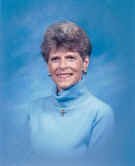Interview with Orene Horton.
 I want to thank Ms. Orene Horton for her time and interest with the interview.
I want to thank Ms. Orene Horton for her time and interest with the interview.
Who influenced you the most towards gardening?
Both of my grandmothers, and my mother. One grandmother had a vegetable garden, but she loved irises. She loved gardening, but had a passion for one particular plant. The other grandmother lived on a farm near ours and had the biggest and best vegetable garden I've ever seen. She also had access to all the fertilizer you'd ever want. She grew every kind of unusual berry and unusual vegetable I've ever heard of. We also spent a lot of time looking for wildflowers in the woods, picking blackberries together, and talking about plants.
What is your favorite gardening topic?
Anything I can plant in my own garden.
If you could live anywhere in the world, totally based on gardening, where would it be?
The Pacific Northwest - Oregon, because of the climate.
When in the scheme of things, did you decide gardening was a major factor in your life?
Although I've always gardened, I didn't get bitten by the bug until we moved to Columbia in 1978. I had an old garden to completely redo and really got into the process. I read gardening books, took classes, and became involved in the Master Gardening program.
What is your most difficult personal challenge in gardening?
Trying to grow plants that require more sun than my shady garden allows them. Another challenge is keeping under control plants that simply grow too well here, e.g. my Lady Banks rose that's taken over the neighbor's crape myrtle. Remembering to be thankful for my small garden that gives me plenty to do rather than wishing for more room.
What considerations, when you write, do you feel are most important to the "new" gardener?
New gardeners need to learn about soil first. You can't just stick a plant in whatever kind of soil you happen to have in your yard. You've got to prepare good soil for the plants to grow in. Next they need to know about sun and shade, and watering. They need to know the resources at their disposal - the best books, the best nurseries, the best gardeners to ask for advice.
What do you consider "no-fail" plantings and why?
I'm not sure there are any. "Easy to plant" would be annuals in containers, if you water them. It's easier to garden with shrubs than it is with perennials, annuals, and bulbs. Shrubs make a bigger show and don't require as much bending and kneeling.
When giving design considerations, what do all gardeners, experienced and new, need to keep in mind the most?
A garden needs a controlling design. It needs to be laid out well for the uses the family and the gardener have for it. You need a plan before you start.
Living in the South, how successful do you feel organics are becoming?
People are trying their best to garden organically. Sometimes it's frustrating, because a lot of things don't respond to organic methods. I like to try to use IPM - Integrated Pest Management. You do the least invasive things first, like squirting a hard stream of water on aphids. If that doesn't get rid of them, you use something like Safer soap. Other things, like Japanese beetles, white flies, thrips and scale are tougher to deal with organically. Composting is becoming more popular as people recognize its importance in improving the soil.
What is your favorite part of the garden and why?
The front yard, because it has many different kinds of plants - small trees, shrubs, bulbs, and perennials in it - there's something blooming in the front yard almost all the time.
Do you have a favorite gardening tool?
My stirrup-handled spade with a fairly narrow blade.
When writing for your publication, where do you get your inspiration?
From my garden - what's going on there at that particular time of the year. Or, it could be from questions I've been asked. Or, it could be my own curiosity about a particular plant.
What has been the most significant turning point in your career?
Probably getting my first garden writing job - writing articles for "Columbia Metropolitan" magazine. Taking the Master Gardener course was also a significant turning point, as was a talk I gave at Callaway Gardens. The Garden Editor of "Southern Living" heard it and asked to come see my garden.
The most enjoyable part of your job?
Working in my garden and watching it change through the seasons. Meeting my readers and encouraging them.
Please share with us the most valuable lesson you have learned in gardening?
Gardening is a great conversation topic, and gardeners are usually friendly, generous people who are fun to work with. Gardening also teaches patience, an appreciation of nature, and how plants, people, and animals are all connected.
Also see Orene Horton's biography.